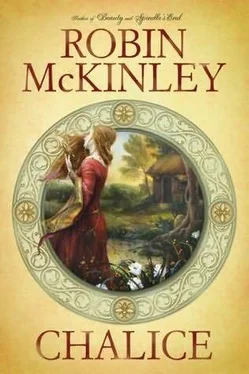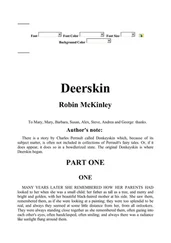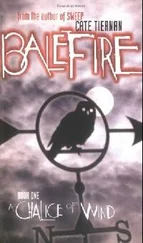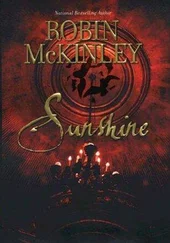“Of course,” said Mirasol. “Every beekeeper is stung. Hasn’t your cat ever scratched you?”
“That’s different,” said Selim, but she sat back in her chair.
Mirasol found the hum of her bees soothing—bees and honey were two more things that went on and on—but neither sunlight, stone nor bees could distract her long. Distantly she still felt the land lamenting its loss—an almost tangible drumming under her feet. The earthline that ran through her meadow had the restless, unhappy, unseeing manner of a horse pent and pacing in its stall when it is used to being able to run loose outdoors. “What—what will happen now?”
Selim knew she was asking about the news Selim had brought. She shrugged. “I don’t know. Branda said he’d see Gota today.” Gota spoke to the House for all the woodskeepers, because his woodright contained Willowlands’ ancient willow coppices and was thus the most important of all the demesne’s woodrights. “So if there’s anything to know Gota will tell us.”
“The Master’s brother…” Mirasol began, and didn’t know how to continue.
After a pause Selim said, “Yes. We’re all thinking about him. But nobody comes back from the Elemental priests. He’s been there seven years; that’s too long.” She didn’t have to add, Down-brook was given an outblood Master sixty years ago, and it has still not recovered from the shock of the change. Nor did she have to add, And Willowlands was already under strain, from seven years of an increasingly bad and careless Master and a Chalice who put no check on him.
And when, almost immediately after Selim’s visit, things had begun to go wrong for Mirasol, the truth never occurred to her. She guessed it was to do with the devastating loss of Master and Chalice, but assumed that equally strange and punishing things were happening to everyone in the demesne.
She lived in a small cottage in that corner of Willowlands’ old forest which she tended; whose tending was her inheritance from her father. Ordinarily she saw Selim or Kard or Marn at least every few days; their woodrights bordered on hers, and the woodskeepers were a close group throughout this and every demesne. Two days after Selim’s visit Kard had stopped only long enough to tell her that despite the unlikelihood of any result, the Grand Seneschal had written to the priests of Fire about the younger brother of the dead Master.
Kard had looked worried and preoccupied, and had been in a hurry, and Mirasol asked no questions. She was worried and preoccupied too, and also in a hurry, because things had already begun to go wrong. And after that some time passed when she saw no other human soul. But she was too busy—and too distressed—to go in search of someone to talk to. The loss of Master and Chalice would have thrown all the demesne’s workings into confusion, but she soon felt that she did not want—did not want to risk—telling anyone what was happening to her for fear that she would be one of those whose landrights did not survive the current wreck.
She had guessed that her axe would not strike true, so she had put the heavier work aside for the present. There were always smaller tasks mounting up that she never quite kept up with the way she wanted to, although she knew that was normal enough. But the day Mirasol came home from tending the ash grove which the Lady had blessed, she found that one of the big crocks in the cellar where the end of her winter’s mead remained had foamed up and run over. This in itself was annoying and wasteful and had to mean that she had set it up badly and been trapped by her own incompetence, but it was also surprising. If this had happened five years ago she wouldn’t have thought beyond finding out what she had done wrong. But she knew—mostly—what she was about by now. That this should happen was almost frightening.
And then it was indeed frightening when she realised that it had not merely run over, but had covered the cellar nearly knee-high in froth and mead—which was frankly not possible. Even if she’d tipped the crock over herself what it contained couldn’t have done more than make a large sticky puddle.
She spent much of the next several days scooping the mead-lake into buckets and hauling the heavy buckets to the roots of favoured trees—and being followed by clouds of interested bees. They landed all over her—anywhere the mead might have splashed, which was everywhere, and in the buckets, on the ground, and especially the tree roots where she poured the mead, where the tiny cracks and irregularities in the bark made tiny reservoirs—but none of them stung her, even when she heedlessly and impatiently brushed them away. At least, she thought grimly, her inconvenient windfall should not go entirely to waste; she remembered the honey the bees had made from the mead she’d given them the first winter after her mother died—when she had made a mistake. Although that mistake was merely that she’d found she couldn’t bring herself to kill any of her bees, which was the system all the northern demesnes used, and so had to get them through the winter somehow. She’d been cold that winter herself, after wrapping up her most exposed hives in all the blankets she had.
Perhaps the trees too would like their improbable drink enough to produce especially rich blossoms for the bees next year. It seemed remarkably strong mead, for all that it had no excuse for its existence. She never tasted it, but the mere smell rose to her head and made her dizzy.
As a result of the mead-lake and its aromatic effect she took to sleeping outside at some little distance from her cottage. While the earth floor of the cellar had been beaten hard enough by many generations of feet to prevent the mead from turning it into a bog, the reek remained, and she found this gave her wild, terrifying dreams of fire and water, which were no improvement on the nightmares she’d had since the deaths of Master and Chalice. She asked the Radiant Pines, whose resin was used for perfume, if they could spare her some boughs, and when they said yes, distributed them across her cellar floor, but even they were not enough. She wondered how long she would be exiled; it was all very well now in summer, but by next winter, she would need to be back in the cottage, with its sturdy walls and stone hearth—and next winter’s mead in the vat in the cellar.
But by the time she had done what she could to rescue her cellar, other things were going wrong. Her two goats, Nora and Spring, were suddenly producing so much milk that they baaed miserably for relief twice and even three times a day, which meant that she had to stay near the cottage to get back to them, and that meant she could not tend the full extent of her woodright. This would become another trouble for her as soon as anyone noticed; but she was already unhappy at the idea of neglecting her trees, especially now, when they needed reassurance, as did every living thing in the demesne. Nor was she equipped to handle so much milk; she had nowhere to keep it, let alone time to turn it into butter and cheese and hilliehoolie.
But what hurt the worst of all was the fact that the beehives near the cottage, incredibly, were literally running over with honey.
The mysterious excellence of Mirasol’s honey had probably held her woodright for her. By the time her mother had died only two years after her father, she should have married someone without a landright of his own, to help her with her bees and her woods; it was not proper she maintain both alone, even though she was capable of the extra work. And so by clinging to this impropriety she had grown used to the sense of needing not merely to serve but to placate the Housefolk and the lesser Circle members—most of whom also bought her honey—who were more concerned in the everyday lives of the common folk of the demesne. A surplus would have done her good with those who had the power to injure her—if she had had the time to collect it, strain it, bottle it and take it to the House. Yet if she tackled the honey glut, she would fall even farther behind in her woodskeeping—and the demesne’s woods were growing ever more restless with no Master holding the earthlines steady and no Chalice to bind and calm.
Читать дальше












